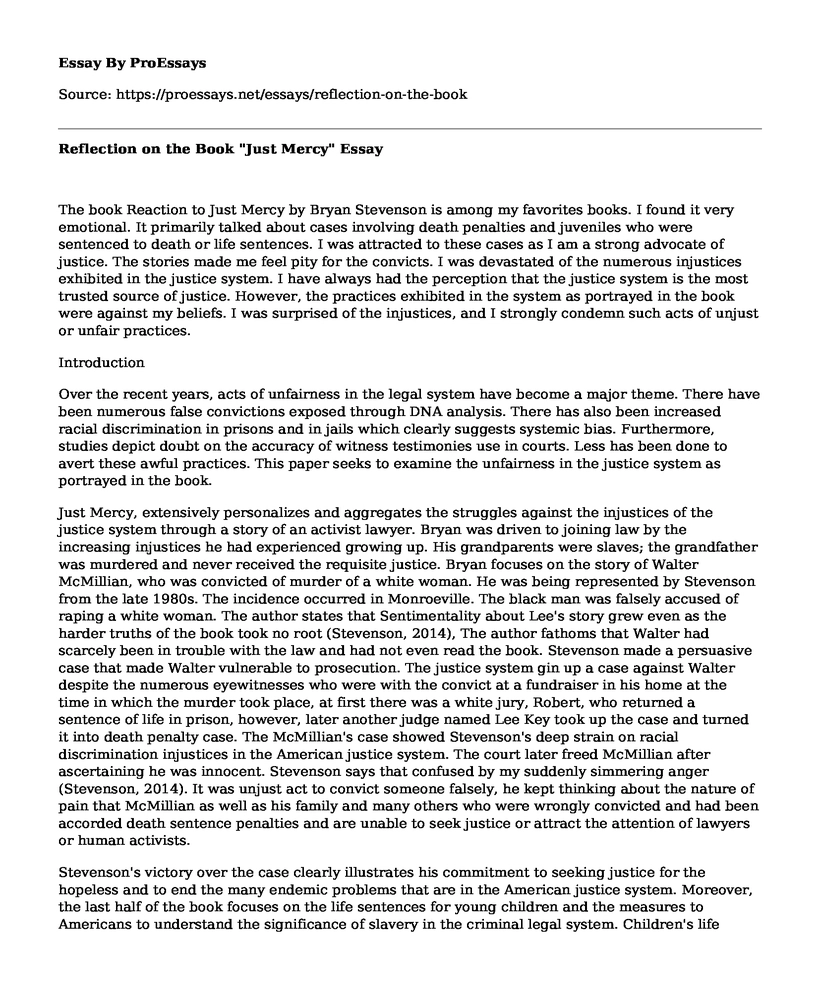The book Reaction to Just Mercy by Bryan Stevenson is among my favorites books. I found it very emotional. It primarily talked about cases involving death penalties and juveniles who were sentenced to death or life sentences. I was attracted to these cases as I am a strong advocate of justice. The stories made me feel pity for the convicts. I was devastated of the numerous injustices exhibited in the justice system. I have always had the perception that the justice system is the most trusted source of justice. However, the practices exhibited in the system as portrayed in the book were against my beliefs. I was surprised of the injustices, and I strongly condemn such acts of unjust or unfair practices.
Introduction
Over the recent years, acts of unfairness in the legal system have become a major theme. There have been numerous false convictions exposed through DNA analysis. There has also been increased racial discrimination in prisons and in jails which clearly suggests systemic bias. Furthermore, studies depict doubt on the accuracy of witness testimonies use in courts. Less has been done to avert these awful practices. This paper seeks to examine the unfairness in the justice system as portrayed in the book.
Just Mercy, extensively personalizes and aggregates the struggles against the injustices of the justice system through a story of an activist lawyer. Bryan was driven to joining law by the increasing injustices he had experienced growing up. His grandparents were slaves; the grandfather was murdered and never received the requisite justice. Bryan focuses on the story of Walter McMillian, who was convicted of murder of a white woman. He was being represented by Stevenson from the late 1980s. The incidence occurred in Monroeville. The black man was falsely accused of raping a white woman. The author states that Sentimentality about Lee's story grew even as the harder truths of the book took no root (Stevenson, 2014), The author fathoms that Walter had scarcely been in trouble with the law and had not even read the book. Stevenson made a persuasive case that made Walter vulnerable to prosecution. The justice system gin up a case against Walter despite the numerous eyewitnesses who were with the convict at a fundraiser in his home at the time in which the murder took place, at first there was a white jury, Robert, who returned a sentence of life in prison, however, later another judge named Lee Key took up the case and turned it into death penalty case. The McMillian's case showed Stevenson's deep strain on racial discrimination injustices in the American justice system. The court later freed McMillian after ascertaining he was innocent. Stevenson says that confused by my suddenly simmering anger (Stevenson, 2014). It was unjust act to convict someone falsely, he kept thinking about the nature of pain that McMillian as well as his family and many others who were wrongly convicted and had been accorded death sentence penalties and are unable to seek justice or attract the attention of lawyers or human activists.
Stevenson's victory over the case clearly illustrates his commitment to seeking justice for the hopeless and to end the many endemic problems that are in the American justice system. Moreover, the last half of the book focuses on the life sentences for young children and the measures to Americans to understand the significance of slavery in the criminal legal system. Children's life sentences have now been abolished.
In conclusion, it can be ascertained from the analysis above that there exist racial injustices in our legal systems. It takes the bold actions such as those exhibited by the activist lawyer Stevenson to bring an end to the malpractices in the justice system.
References
Stevenson, B. (2014). Just mercy: A story of justice and redemption.
Cite this page
Reflection on the Book "Just Mercy". (2021, Mar 13). Retrieved from https://proessays.net/essays/reflection-on-the-book
If you are the original author of this essay and no longer wish to have it published on the ProEssays website, please click below to request its removal:
- Letter of Intent to Department of Homeland Security
- The Significance of the Title 'Fences' Essay
- Cybercrime Case Study
- The Death Penalty in the US - Paper Example
- Literary Analysis Essay on Satan's Heroism in 'Paradise Lost'
- Nawal El Saadawi Biography and Writings Essay Example
- Rape Victim's Life: Aimee Duffy's Story of Being Alive But Dead - Essay Sample







